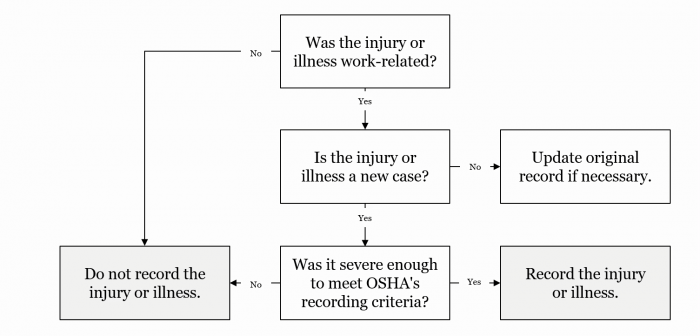
Finishing off our 3-part series on The Occupational Safety & Health Act (OSHA), this week we’re talking about employer recordkeeping requirements. We’ve already established that OSHA’s reporting requirements apply to all employers. Now, we’ll talk about which employers are subject to OSHA’s recordkeeping requirements. Read on to learn who is required to maintain these records, and what you’re required to keep if you are eligible.
OSHA Forms
Certain covered employers must prepare and maintain records of serious occupational injuries and illnesses. This is done with a number of OSHA Forms, including:
- 301: Injury and Illness Incident Report
- 300: Log of Work-Related Injuries and Illnesses
- 300A: Summary of Work-Related Injuries and Illnesses
Alternatively, employers may use equivalent forms with at least the information required on these forms and with the same instructions. For example, a workers’ comp insurance claim form in place of OSHA Form 301.
Top Tip: Reporting does not declare fault, indicate an OSHA rule was violated, or than an employee is entitled to workers’ compensation. These are completely independent of one another!
1-10 Employees
For employers with 10 or fewer employees, recordkeeping is not required. This employee count is based on peak employment during the past calendar year, across the entire company. (Meaning, not just in one location.)
The only exception to this is if the company is notified in writing by OSHA or the BLS to do otherwise.
11+ Employees
Conversely, employers with 11 or more employees must follow OSHA’s routine recordkeeping requirements. However, employers in NAICS-classified low-risk industries are exempt. For example, some retail stores, eating and drinking venues, many professional service industries, etc.
Ultimately, eligibility is based on each individual business establishment. So, if an employer has several business establishments with different NAICS codes, some may need to maintain OSHA records while others may not.
Top Tip: Need help determining your business’ responsibilities under OSHA? Get in touch with us to schedule a meeting with our Director of Compliance Brett Strauss, Esq. to learn more!
What’s Recordable?
Now that you know whether or not you’re required to keep records of injuries and illnesses under OSHA, how do you determine which incidents to report? Recordable injuries and illnesses must meet the following criteria:
Work-Related
First, the injury or illness must be work-related. Meaning, the employee’s work must have caused or contributed to the resulting condition. Or, the work must have significantly aggravated a pre-existing injury or illness. The injury or illness would not be considered work-related if the individual was:
- Present in the workplace as a member of the general public.
- Voluntarily participating in a medical, fitness, or recreational activity.
- Performing personal tasks such as food preparation or consumption.
- Intentionally inflicted.
Top Tip: Looking to improve your workplace safety? Here are 7 ways to encourage workplace safety.
Severe
Next, the injury or illness must be severe enough to meet OSHA’s recording criteria. Per OSHA, the definition of severe injuries and illnesses includes:
- Death.
- Days away from work.
- Restricted work activity or job transfer.
- Medical treatment beyond first aid.
- Loss of consciousness.
- Significant injuries/illnesses diagnosed by a medical professional.
And the verdict is…?
Now that those trickier criteria are out of the way, you can use the roadmap below to determine whether or not to record the injury or illness!

Retention Requirements
Employers must maintain records for 5 years following the end of the calendar year the records pertain to. During this time, employers must update their stored OSHA 300 Log if the description or outcome of a cases changes.
Top Tip: Employers do not need to update their 300A or 301 forms. However, you can if you choose to!
What do you think?
Let us know in the comments below your own experience with OSHA recordkeeping requirements! If you have any questions or need assistance with your responsibilities, contact our Customer Service team at (866) 946-2032. You can also browse our online OSHA compliance store to pick up any postings, kits, or training you may be missing.
Last but not least, don’t forget to log on to your HR Support Center for full access to our entire library of employment laws, checklists, and more to stay on top of your requirements. And be sure to check us out on Facebook, Twitter, and LinkedIn for even more HR tips & tricks!
Photo by Oleg Magni from Pexels
